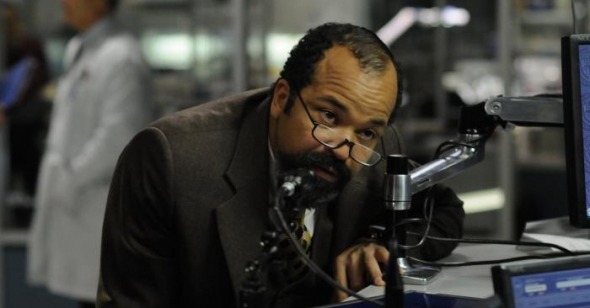Monday Hangover
Source Code
by Adam Nayman and Eric Hynes
On Mondays, two Reverse Shotters wipe the weekend from their bleary eyes and engage in a postmortem on the multiplex trash (good or bad) they took in.
[Beware: spoilers ahead.]
At this point, writer-director Duncan Jones at least has an artistic identity. He’s a mildly clever sci-fi conceptualist in thrall to a single conceit: perplexed characters caught in experiential loops. As in his 2009 debut, Moon, which cast Sam Rockwell as a human clone coming to terms with his artificiality, Jones’s script for Source Code features a perplexed protagonist navigating an externally induced identity crisis. Air Force helicopter pilot Colter Stevens (Jake Gyllenhaal) awakens on a commuter train bound for Chicago to find that he’s occupying another man’s body—this realization is quickly topped in the bizarro sweepstakes when the train blows up and he zaps back to awareness in a dank iron capsule receiving transmissions from what appears to be a U.S. Army base. Expository dialogue between our hero and the woman on the other end of the video-conference line (Vera Farmiga) clues us in that he’s an (unwilling?) operative in a high-tech military initiative, in which he has been beamed brain-first into an avatar who’s since been confirmed dead in the train crash’s aftermath in order to figure out who planted the bomb that caused the catastrophe. This is no mean feat since his adventures in “time reassignment” are limited to eight-minute intervals.
The combination of precisely observed repetition-variation gags and solemnly ludicrous pseudo-science gives Source Code a nice enough setup. Unfortunately, as in Moon, Jones isn’t so good at providing payoffs. Stevens refuses to accept that the people he meets during his forays into the past—including his adorable seatmate (Michelle Monaghan)—are fated to die, and so he sloughs off his assigned role as observer and tries to change the outcome outright. It’s at this point that Source Code loses its lean shape—its best feature —to become an ungainly hybrid: call it Groundhog Déjà Vu. We’re supposed to be moved by Stevens’s attempts to cheat chronology and save a group of total strangers, but the film is as cynical about this collection of once-and-future terrorist victims as the mission’s slimy chief scientist (Jeffrey Wright), who just wants to make sure the technology works and could care less about the ethics and effectiveness of extratemporal intervention.
And then there's the matter of the film’s ostensibly provocative but actually just ridiculously wrongheaded coda, which treats the casual erasure of a human life as a catalyst for rom-com giddiness—I doubt there will be a worse ending this year. —AN
While I don’t share your backhanded confidence in Hollywood endings yet to come, Adam, I agree entirely that Source Code’s was wrongheaded, distractingly nonsensical (whereas for much of the film, nonsense is a mild tariff for fantasy), and morally baffling. Jones kept asking me to feel things I couldn’t, to passively accept unacceptable outcomes—and now I’m strictly talking about character and emotion, not sci-fi illogic. I was really thrown by the film’s demonization of Jeffrey Wright’s character, Dr. Rutledge. Though designed for us to distrust—he’s a military bureaucrat with a goatee, a comb-over, an affectedly commanding voice, and a gimpy leg—Rutledge is a hero based on what actually happens the film. He does nothing less than, 1) save Chicago from one seriously pimped-out dirty bomb, and 2) develop a battle-tested system for anticipating and averting catastrophic events. But I’m supposed to hate him because of his lack of people skills, and because his solution for rescuing entire cities of people is perhaps, perhaps, disrespectful to the dead? Come again? Only to have the coda put all reservations aside and affirm that the world-saving project will go on—but this time thanks to G.I. Joe, not some thinky, sciency sissy.
I’m willing to accept and even champion the charms of Mr. Gyllenhaal, but fixed fast to his side for these 93 minutes I reckoned the disservice visited upon him by any film that demands he be taken seriously. With his giant, bloodshot eyeballs (like he’s been bonked on the head in a Woody Woodpecker cartoon, torpedo welt blasting heavenward), extendedly equine mid-face, and lusciously articulated lips, he’s the farthest thing from a grim everyman. He’s singular, unique, boyishly hot, and very goofy—especially when he works that thinly graveled Valley voice of his. When harnessed and appreciated, these are assets. When ignored, or when I’m asked to accept them as common, silliness reigns supreme. But Jake can’t solely be blamed for how absurd Source Code becomes, for its thick and sloppy scoops of exposition, for its noncommittal excursions into father-son regret and life affirmation. It would have made for a promising TV pilot—indeed that ending seems designed to establish a series of high concept, closed-circuited interventions—something like a techno-blustery, inadequately humorless Quantum Leap or Voyagers. Lord knows there’s much worse out there, but that doesn’t make Source Code any more functional, by genre or even self-written rules, or any less ridiculous. —EH
